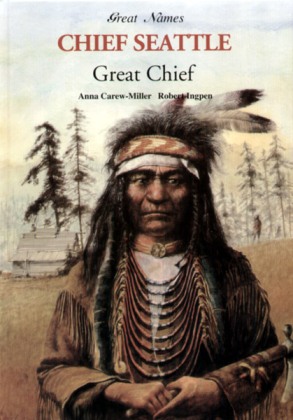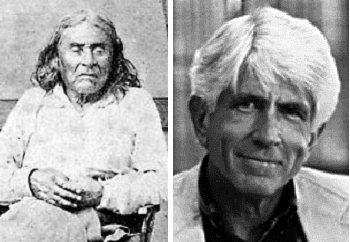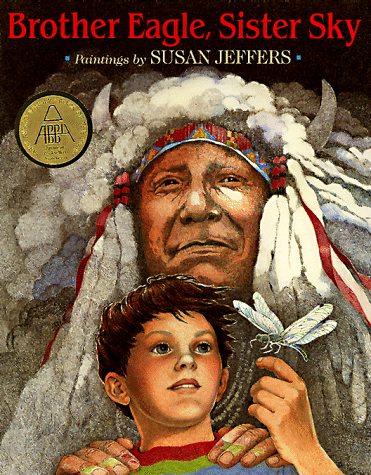
“All things are connected. Whatever befalls the earth befalls the sons of the earth. Man does not weave the web of life; he is merely a strand of it. Whatever he does to the web, he does to himself.
“What is man without the beasts? If all the beasts were gone, man would die from a great loneliness of the spirit. For whatever happens to the beasts, soon happens to man. All things are connected.”
These words resonate very well in the environmental community, and are in fact considered to be something like a gospel of the greens. They are part of a moving speech that native American Chief Seattle is said to have given in January 1854. Read the full text here.
So these would be just the right sentiments to invoke on another Earth Day, right? Yes — except that Chief Seattle never uttered those words. They were, in fact, written by a screen writer in 1971 for a film about pollution and the plight of the Earth, called Home.
Tell that to thousands of die-hard greens who swear by Chief Seattle. By now, a couple of generations of people have been moved by the “speech.” Chief Seattle societies have formed in Europe. The supposed remarks have been reprinted widely and authoritatively cited in serious books on environmental issues, and quoted in high level speeches. Hundreds of teachers use extracts in environmental courses.

There’s absolutely no doubt that the words pack a great deal of traditional wisdom, poetic expression and what researchers like to call ‘indigenous knowledge’. This is how it ends: “Continue to contaminate your bed and you will one night suffocate in your own waste. When the buffalo are all slaughtered, the wild horses all tamed, the secret corners of the forest heavy with the scent of many men, and the view of the ripe hills blotted by talking wires. Where is the thicket? Gone. Where is the eagle? Gone. And what is to say good-bye to the swift and the hunt; the end of living and the beginning of survival.”
The value, modern-day relevance and power of the speech are not in doubt. But the problem is in its attribution: the wrong man is being credited worldwide for coming up with these oh-so-quotable words. And the misconception originated with a film script, where creative liberties are allowed and often exercised!
Conservationist, writer and analyst Andy Kerr has traced the evolution of a modern myth in his column:
“Yes, Chief Seattle (more correctly Seathl) did give a speech in 1854 to Isaac Stevens, Pacific Northwest Commissioner of Indian Affairs. Dr. Henry Smith translated the speech from the original Lushotseed. Smith knew it to be special and that much was lost in his first oral translation. He supposedly visited the Chief many times in the following decades to get the words right in English. He published his translation in 1887 in the Seattle Sunday Star. According to Smith, the Chief spoke of his sadness about the grave injustice being visited upon the Indians by the European invaders and the absurdity, in the Chief’s view, of claiming land as one’s own and of not respecting ancestral ground.
“It was in the Victorian oratorical style of the time, and was soon forgotten. Professor William Arrowsmith, who taught classic literature at the University of Texas, came across the Smith version and modernized it in Arion in 1969. He changed it to reflect the protest-style of the 1960s. On the first Earth Day in 1970, Arrowsmith read his modified text before a large crowd.

“In that crowd was Ted Perry, a professor of film, who had been retained by the Southern Baptist Television Commission to draft a script for a film about pollution and the plight of the Earth, called Home. In a third execution of literary license, Smith turned it into a speech about poisoning the planet and human indifference to it. Perry’s concept was to transport Chief Seattle into the modern world and imagine what he would say.”
The documentary film on ecology, scripted by Ted Perry, was produced by the Southern Baptist Radio and Television Commission, and later ran on network television. But not before the original script was edited for being more Christian, and some references to God were added.
John Scull, specialising in eco-psychology, has traced the evolution of the Seattle myth in an interesting essay. He notes: “The Perry speech, in spite of its Christian editing and its many historical inaccuracies, anachronisms and inconsistencies, was widely distributed and was seen as authentic by many…The text’s lack of authenticity was finally described in 1987, and documented in articles in both Omni and Newsweek in 1992.”
In April 1991, the New York Times ran a front-page expose of the Chief Seattle myth, saying: “A number of historians say Chief Seattle never said most of what he is supposed to have said.”
NYT quoted historian David Buerge as saying: “Chief Seattle is probably our greatest manufactured prophet,” and described him as ‘one of the scholars frustrated that their work has failed to stop the myth from spreading around the world.’
In his analysis, John Scull poses the query: Why are environmentalists so eager to continue to attribute these words to Chief Seattle instead of to their author, Ted Perry?
Perry, now a professor of film studies at Middlebury University, has tried repeatedly to set the record straight. Moreover, he thinks that the myth is pernicious. “Why are we so willing to accept a text like this if it’s attributed to a Native American?” he asks. “It’s another case of placing Native Americans up on a pedestal and not taking responsibility for our own actions.”

The myth of Seattle’s speech has been so pervasive that the Washington State Library issued a pamphlet in 1993 stating the facts. “The most important fact to note is that there is NO VERBATIM TRANSCRIPT IN EXISTENCE. All known texts are second-hand,” Nancy Zussy, State Librarian, said in that note.
That note listed four different versions of the speech. The most widely known of all, it said, was written by Texas professor Ted Perry as part of a film script. “The makers of the film took a little literary license, further changing the speech and making it into a letter to President Franklin Pierce, which has been frequently reprinted. No such letter was ever written by or for Chief Seattle.”
So is there anything authentic left of poor Chief Seattle? There’s no doubt the man cared deeply for his people and the environment, even if he was nowhere near as eloquent as modern-day environmentalists want us to believe. Sadly, we don’t even know what the old boy really looked like.
According to a story by Malcolm Jones Jr. and Ray Sawhill, appearing in Newsweek of 4 May 1992: “Even the one known photograph of him has been doctored repeatedly. In the original, his eyes were closed. Subsequent version were retouched so that his eyes looked open. In some versions, he carries a cane, but not always. And in the most revisionist makeover, his head has been grafted onto the body of another man.”
So is it just historical accuracy at stake here, in our setting the record straight about Seattle as scripted by Perry? Does it really matter whether or not the Indian chief actually said it as long as his alleged words continue to inspire environmental commitment?
I share Dr John Scull’s views when he says: “The world is in an environmental crisis and needs help, but a mythical Indian chief from the last century is not going to ride over the hill and save it from the industrial cavalry in some reversal of the Hollywood western — all of us are going to have to work together to save it ourselves. Recognizing that at least some of the answers lie within mainstream contemporary culture might be a good place to start.”
Read The Little Green Lie, by Mary Murray, Reader’s Digest, May 1994
I didn’t know this story behind the wonderful speech. Are you quite sure of all these sources you have cited? It sounds a bit like an organised attempt to discredit a great leader of indigenous people. Screen writers may have the gift of the gab, but it takes a special man of the grassroots to have this kind of vision. Don’t play into hands of conspirators@!
Memo to Ayesha:
Back in the late ’80s or early ’90s, one of NPR’s reporters (Noah Adams or Alex Chadwick ?) did an “All Things Considered” radio story on the “Chief Seattle Speech”. In an interview with it’s true author, Ted Perry, they talked about how Perry had written the piece as part of a movie script back in the early ’70s. Perry was, as I recall, at least mildly annoyed that his (wonderful) bit of poetic prose had been attributed to some actual historic speech by Chief Seattle. In the way of some rumors, someone probably unwittingly picked up the mis-attributed work and “ran” with it. The NPR story was my first exposure to this unintended hoax.
So much “belief energy” has gone into this famous fictitious speech that it may not ever be correctly attributed to it’s true author. A little bit of serious history sleuthing on the life of Chief “Seattle” will set most readers’ on a better keel. If you think about it, such beautiful oratory coming from the mouth of anyone is rare – to believe that a man living in the relative wilds of 19th Century Puget Sound, for whom English was, at best a second language, stretches one’s imagination beyond good reason. I imagine Ted Perry enjoys a rueful laugh over it now.
I must admit to some disappointment in finding out that this beautiful speech really originated as part of a ’70s-era environmentally inspired movie.
This article completely misses the point, which is that Ted Perry’s version was fundamentally and unequivocally based on Dr Smith’s original translation of Chief Seattle’s speech, as taken down verbatim at the time. Either that, or Dr Smith made it up himself – a possibility that seems, on the face of it, exceedingly unlikely. Forget the word order and occasional anachronistic insertions; the inspiration is almost certainly Chief Seattle’s and his alone. Perry merely added a little extra embroidery to an already compelling message.
Those who mock environmentalists for referring to the speech should remember that even if it had been written last week, its power would remain. There are those who still doubt that Shakespeare could have written all those masterpieces. In the unlikely event that the doubter are one day proved right, would the masterpieces themselves suddenly become second-rate? I don’t think so.
Comments from Ayesha and Jeremy Fox – and similar ones I received offline since this blog post was written – show how widely prevalent the Chief Seattle myth/romanticism is. Question it a little, and the greens snap back angrily as if their scripture has been undermined.
Come on, people! Before you berate me, please read the post carefully. I wasn’t at all ridiculing the Old Boy, but was simply asking that we acknowledge Ted Perry’s role in popularising the speech, even if he inadvertently inspired a modern myth in that process. So let’s give credit where it’s due — in this case, both Chief Seattle and Perry.
i want the books of seatle. i have been in the book shops, i was hoping if one have an electronical copy i can have it.
@Mpho,
As far as I know, Chief Seattle never wrote anything – books, leaflets, speeches or anything else. That’s the whole essence of my blog post above. However, there are others who have written ABOUT Chief Seattle (some titles references in my post), often romanticising or eulogising the old boy to the point where he has now become a legend. Well and good up to a point, as long as we know where it all stems from, and the limits of this wisdom…
Just a thought. If one would replace in your comment “Chief Seattle” with “Jesus Christ”, it would sound like this:
“As far as I know, Jesus Christ never wrote anything – books, leaflets, speeches or anything else. However, there are others who have written ABOUT Jesus Christ, often romanticising or eulogising the old boy to the point where he has now become a legend. Well and good up to a point, as long as we know where it all stems from, and the limits of this wisdom…”
It might be factually correct, but I’m sure some would find it a bit offensive. Let’s leave the spirit of great Chief Seattle to rest in peace. By the way, acts and deeds are more important than words. The fact is that North American Indians were living in harmony with nature and understood it better than many people today.
Native Americans were reported to be gifted speakers. Many have spoken about this including Henry Harrison and Thomas Jefferson. Harrison on Tecemseh and Jefferson on a Chief Logan who made a speech in Ohio. NAs hold the high ground on environmental history. They smelled us out. They were quite capable of oratory. I mean who calls themselves names like “Touch The Clouds” We call ourselves names like Dick and Jane. Give me a frickin break.
@Mark Harper,
All that glitters is not necessarily gold. But gold glitters too! We have to discern what’s real and what’s imagined.
Who cares? Does it really matter if Chief Seattle, Gandhi, the Dalai Lama, Jack, Joe, or John said it? It’s the truth and it makes perfect sense!! It doesn’t matter whose mouth it came out and which medium was used to spread it. Stop focusing on who said this or that! It’s irrelevant! Instead spend your time and energy changing the f’d up perverted ways we hypocrite humans run our societies and consider ourselves as being civilized and humane!
The links you provide to Andy Carr’s writings on the myth of Chief Seattle’s words are defunct. Further, after repeated “Google” searches, I can find no mention of a conservationist named Andy Carr or his tracing of the evolution of this myth. I did find a conservationist named Andy Kerr, but he does not appear to have written anything about Chief Seattle. Can you update your references?
@queeniemoon:
Thanks for pointing this out.
I have corrected the name as Andy Kerr, and have updated the link which now works.